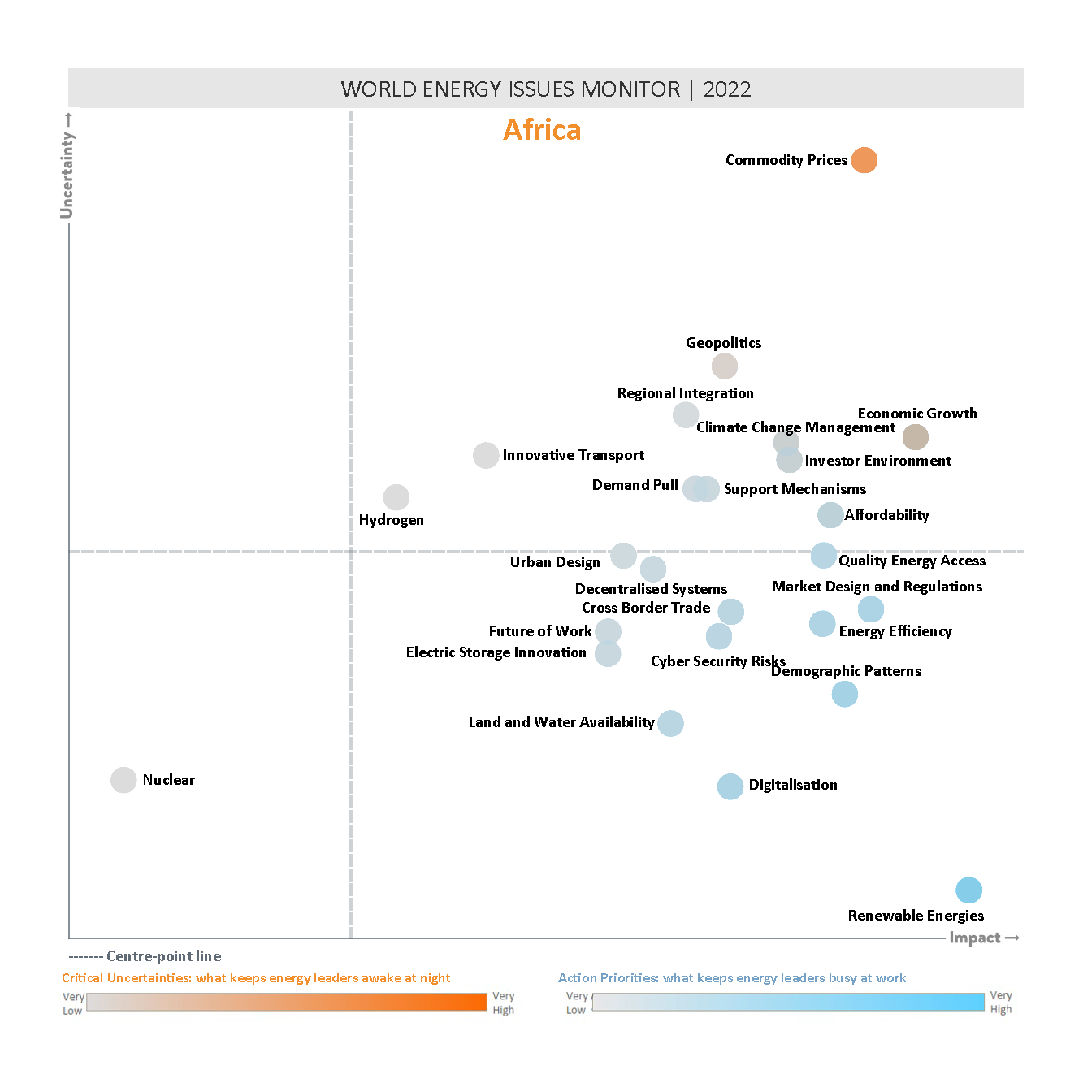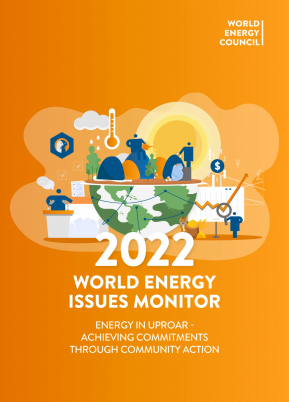Africa Network
The Africa regional network currently spans from Algeria, Tunisia and Egypt in the North to Namibia and Kingdom of Eswatini in the South, including many Central African countries. While the continent is endowed with untapped human capital and significant conventional and renewable energy resources, an estimated 600 million people still lack access to electricity.
National Member Committees are interested in engaging in activities and events that provide opportunity to collaborate cross-border to establish dialogue, foster an exchange of impartial views and best practice, and identify common areas of research and action on issues such as energy access and affordability, energy efficiency, regional integration and interconnectivity, cross-border and trans-continental power transmission network, and tapping the entrepreneurial potential of grassroots innovation.
To facilitate these activities, the African regional network is developing working level relationships with African Union Commission (AUC), COMESA, ECOWAS, African Energy Commission (AFREC), and Association of Power Utilities of Africa (APUA).
Regional action priorities that support the Council’s mission and humanising energy vision are agreed on an annual basis by national Member Committees in the framework of a Regional Action Plan.
Each month, the African regional network meets to discuss matters of mutual interest, drive collective activities, and keep each other updated on relevant developments and events. In addition, throughout the year regionally targeted workshops are being organised to advance discussions in the context of our global insights and innovation tools.
As part of World Energy Week LIVE 2021, a conversation focusing on Capacity building for a net-zero Africa was convened. While many African countries who signed the Paris Agreement have set out on an ambitious plan to reduce their carbon emissions to zero by 2050, many pledges and efforts by governments to tackle the causes of global warming, GHG emissions are still growing drastically. Participants explored what African countries can do to accelerate the implementation of those ambitious target and how they can prepare their populations and workforces to face some of the unavoidable changes and empower them to be enablers of a successful transition.
Furthermore, countries like Kenya and Nigeria are working to launch their own World Energy Academies aimed at advancing in capacity building and energy literacy in the region.
Some countries in the region have developed national Future Energy Leaders Programmes. These work closely with national Member Committees and support activities at the national and regional level
Energy in Africa

REGIONAL OVERVIEW & CONTEXT
Consistent with most other regions, Commodity Prices stand out as the highest Critical Uncertainty in this year’s World Energy Issues Monitor, dominating the Africa Issues map. The remaining issues are clustered in the high impact, lower uncertainty area, around the centre point line of the map, with no clear distinction of priorities.
Consistent with the global map, Renewable Energies remain a stable Action Priority, with impact and uncertainty accorded similar scores to 2021.
AFRICA DEEP DIVE
In 2022, more energy issues moved towards being critical uncertainties at the global level, but this is not observed across the Africa region, where Commodity Prices stand out as the Critical Uncertainty keeping energy leaders across the region awake at night. The significance attributed to this single issue, is likely to be strongly influenced by the timing of the survey, which was completed in Q4, 2021, when gas prices across the region were showing a 40% rise over the previous year.
As net energy importers, most countries in the Africa region are especially vulnerable to commodity price fluctuation, and the related impact that the pandemic has exerted on global markets and supply chains.
Africa’s overall impact on climate change is currently small; yet, the continent remains extremely vulnerable to the effects of global warming. As its young and urban population continues to increase, the region’s impact on the climate is likely to grow and a development approach is required to empower energy transition and mitigate future climate impact.
"We have the task of educating new generations so they can help the whole planet to navigate the transition.
Dr Izael da Silva, PhD, Deputy Vice-Chancellor, Research and Innovation, Strathmore University, Kenya
The decisions taken at COP26 to move to a net-zero carbon world are ones that Africa cannot ignore, and the region needs to ensure that the policies it implements will enable it to meet the net-zero trajectory. With COP27 convening in Egypt in November 2022, there will be a strong focus on the continent and its ambitions.
"Africa is a continent with a young population and abundant energy resource. The impact of the region on climate change is minimum but we are the most vulnerable. Where are we at capitalising on turning disadvantages into advantages?
Dr Hafez El-Salmawy, Professor of Energy Engineering, Zagazig University, Egypt
The Challenge: Commodity price vulnerability coupled with economic growth urgency
The region’s commodity price vulnerability can be explained by its status as a net energy importer, particularly of coal and gas, and regional disparities in access to indigenous resources. However, this has been aggravated by the impact of the COVID-19 pandemic on global markets.
"Commodity prices are very important as they impact on economic growth, government revenue, foreign exchange rate, and financing of critical public infrastructure, in an oil-exporting developing economy like Nigeria. It is difficult to remove subsidies on energy when poverty and unemployment are high. Anything that impacts on commodity prices, like oil, will have a significant effect on oil-dependent economies.
Prof. Adeola Adenikinju, Head, Department of Economics, University of Ibadan, Nigeria
Commodity prices assume particular importance in the region as they are tied to economic growth, government revenue, foreign exchange, and financing of critical public infrastructure. However, the dynamics affecting global commodity prices are exogenous to Africa and are determined by the interplay of forces such as geopolitics, economic recovery and inflation at the global level and in specific trading partner countries, such as China, US, EU and the UK.
Other local issues identified as critically uncertain in Africa include regional unrest, project financing, transition costs and general acceptance of the need for energy transition, and electricity prices. A careful examination of these factors shows that economic growth and a worsening standard of living in many African countries contribute to regional unrest and resistance to energy price increases; it is difficult to remove energy subsidies when poverty and unemployment are high.
Geopolitics is rated highly in this year’s Issues Monitor Survey. This can be explained by disruptive events in Morocco, Tigre, and Kenya and long-standing issues in northern Nigeria. Energy transition is not possible without political stability.
The Opportunity: Leveraging the green economy and digitalisation for economic growth
Low energy access forms part of the reason for the overall low GDP for Africa. There are still 26 million Africans without access to electricity, despite it now being possible to produce electricity in the same place as it is consumed. Energy access also determines access to basic services, health, education, food, sanitation, etc. Decentralisation offers a means to increase accessibility, and Kenya has shown that significant progress can be made in rural access via mini grids, solar home systems and grid diversification.
Action Priority issues such as renewable energies, quality energy access, demographic patterns, energy efficiency, aging infrastructure, and rural electrification are consistent with Africa’s agenda for economic development. There is a need to focus on developing policy priorities and the agenda to move towards a green economy.
Energy transition is favourable for Africa – the continent is richer in renewable energies than in oil and gas. The policy priority is to tap into and develop renewable energies as an energy access tool. The energy infrastructure is still predominantly young, but new infrastructure is also needed. Additional problems lie with the capacity of the energy system and consumer acceptance. There is a need to continue progress on building an integrated, decentralised distributed system to deliver a more efficient supply.
"Rural electrification in Morocco almost at 100% today. Priority is developing smart grids which is a solution for renewables integration and response management. Digitalisation is essential and is a precursor to any programs to achieve energy efficiency. All this is mandatory for Morocco to increase competitiveness domestically and internationally.
Nabil Jedaira, Senior Business Development Manager, EDF, Morocco
Digitalisation, coupled with Internet of Things (IoT) integration, is a necessity for the region. Digitalisation reduces the cost of the production of electricity and enables it to be better targeted, whilst optimisation of big data also saves money and brings down investment costs. Digitalisation is also an essential precursor to any energy efficiency programs.
The Need: Collaboration to create economies of scale and promote investments
Energy leaders across the region consider regional collaboration as the key to maximising the utilisation of renewables, achieving economies of scale and sharing policy best practice with respect to rural electrification, market design and resolving issues surrounding energy privatisation. Joint power projects such as the West African Power Pool and West African Gas pipeline demonstrate the benefits of regional collaboration, along with international interconnection agreements (for example, between Morocco and Spain, and Morocco and Portugal).
Collaboration is also seen as key to applying joint pressure on advanced economies, international development partners and global donors to provide resources to support an African green energy and development agenda and ensure energy transition is a just transition, which leaves no-one behind and does not place significant burdens on individuals.
Establishing a favourable investor environment across the region is considered essential to energy transition. Trade agreements and the development of infrastructure projects to attract investment in the region are required, and Pan-African collaboration can improve stability and increase investor confidence.
Downloads

Regional Perspectives - World Energy Issues Monitor 2022
Download PDF
World Energy Issues Monitor 2022
Download PDF





_368_520_s_c1_c_c.png)





